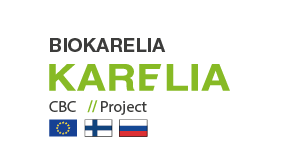Coordinated by the Natural Resources Institute Finland (Luke), the Biokarelia project is developing tools to promote biodiversity conservation. The implementation is based on the mapping of biodiversity hotspots, the observation and forecasting of forest fires and fellings in the Finnish-Russian border area.
Biodiversity ”hotspots” along the Finnish-Russian border are under risk of biodiversity loss due to wood harvesting, forest fires and destruction of connectivity between the high conservation forests.
“The risk of forest fires to cross the border is constantly increasing as a consequence of climate change, and fire suppression in the border zone is difficult,” says Eugene Lopatin, project leader and senior researcher at Luke.
The existing systems of forest fires risk classification in Russia and Finland are not synchronized and the potential of new methodological approaches is not fully utilized. It is expected that costs of fire suppression can be reduced by utilizing the new methods allowing mapping spatial and temporal distribution of risks.
High forest fire risk areas on the map
 The Biokarelia project defines the most important biodiversity hotspots and their connections in the Karelia CBC programme area. A map service based on utilizing open data sources is being developed to detect changes in forest cover as a result of forest fires and fellings. The map service will also include a tool for forest fire forecasting, for which the fire risk is modeled on the basis of weather data, high-resolution remote sensing data, and wood drying models developed by Luke.
The Biokarelia project defines the most important biodiversity hotspots and their connections in the Karelia CBC programme area. A map service based on utilizing open data sources is being developed to detect changes in forest cover as a result of forest fires and fellings. The map service will also include a tool for forest fire forecasting, for which the fire risk is modeled on the basis of weather data, high-resolution remote sensing data, and wood drying models developed by Luke.
“Awareness of biodiversity hotspots and their connections contribute to their protection. The tools developed in the project will allow to identify and further take into account the most important areas for biodiversity in planning fellings and forest fire prevention”, says Eugene Lopatin. The tools will be based on the interpretation of open satellite data, but the project will also test the use of drones to forest fire monitoring and forecasting.
The project will establish a network of actors involved in forest management, nature protection and forest fire prevention, which will further utilize the project results.
The project is implemented in cooperation with the Centre for Economic Development, Transport and the Environment of North Karelia and Arbonaut Oy Ltd. The Russian partners are the Forest Research Institute of Karelian Research Centre, Kostamuksha Nature Reserve and Kalevala National Park, Buro Partner Ltd. and Directorate for regional protected territories for the Republic of Karelia
The project is funded by the Karelia CBC cross-border cooperation programme.
Source: Luke

